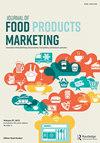用修正的计划行为理论考察健身器材的选择
IF 2.4
Q2 BUSINESS
引用次数: 5
摘要
摘要本研究建立在计划行为理论的基础上,实证检验了一个模型,该模型结合了健康意识、社会影响和风险收益感知对预测消费者购买健身补充剂的态度和意图的影响。虽然过去的研究在理解个人为什么食用各种膳食补充剂方面做出了很大贡献,但本研究揭示了食用健身补充剂,特别是健身补充剂背后的动机。结构方程模型用于测试印度310名受访者的研究模型。本研究的主要发现表明,与运动补充剂消费相关的益处是态度的最重要预测因素,这表明营销人员可以制定有效的营销策略,强调健康益处,以增加消费者购买运动补充剂的意愿。虽然健康意识似乎是最不重要的动机,但社会影响对购买健身补充剂的态度和意愿都有积极影响。此外,还观察到态度对行为意图的重大影响。该研究为寻求制定营销策略和鼓励补充剂消费的营销人员和政策制定者提供了一个可行的模型。本文章由计算机程序翻译,如有差异,请以英文原文为准。
An Examination of Gym Supplement Choice: Using the Modified Theory of Planned Behaviour
ABSTRACT The study builds on the theory of planned behaviour and empirically tests a model that incorporates the effects of health consciousness, social influence, and risk-benefit perception in predicting consumers’ attitude and intention to purchase gym supplements. While past studies have contributed considerably in understanding why individuals consume various dietary supplements, the present study brings to light the motives behind the consumption of fitness supplements, specifically gym supplements. Structural equation modelling is used to test the research model with a sample of 310 respondents in India. Major findings of the present study indicate benefits associated with gym supplement consumption as the most significant predicator of attitude, suggesting that marketers can develop effective marketing strategies emphasizing health benefits to increase consumers’ intentions to buy gym supplements. While health consciousness appears to be the least important motive, social influence is found to positively influence both attitude and intention to purchase gym supplements. Further, a significant and large effect of attitude on behavioural intentions was also observed. The study provides an actionable model for marketers as well as policymakers who seek to develop marketing strategies and encourage supplement consumption.
求助全文
通过发布文献求助,成功后即可免费获取论文全文。
去求助
来源期刊

Journal of Food Products Marketing
BUSINESS-
CiteScore
5.70
自引率
6.90%
发文量
17
期刊介绍:
From food promotion and advertising through new food product development and consumer behavior research, the Journal of Food Products Marketing provides timely, practical articles that keep food marketers on the cutting edge of their profession. The journal includes refereed research studies as well as opinions, guidelines, and speeches by practitioners that contribute to the better practice and understanding of food marketing. The journal provides a single forum for both food marketing academicians and food marketing practitioners.
 求助内容:
求助内容: 应助结果提醒方式:
应助结果提醒方式:


